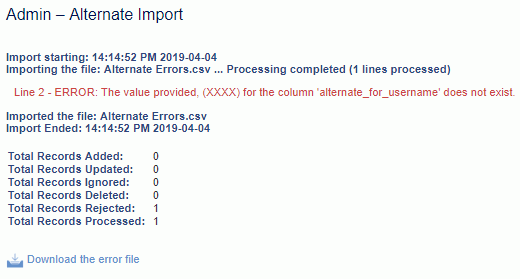|
|
|
|
This feature allows for the updating of open/close status on Purchase Orders via an import. Only POs with a status of "OPEN" or "CLOSED" can be imported. If you open a PO, then all of the detail lines for that PO and approved Mods are also opened (even if the original PO was already open). This is different from the user interface where you can specify which lines to open. If you open a detail line that is closed and the PO is also closed, then both the PO summary and the PO line will be opened.
If you close a PO that is currently open, then all of the detail lines for the approved PO and Mods will be closed as well.
The following validations apply to this import as well as when opening/closing via the user interface:
POs (or PO lines where applicable) cannot be closed if there are any outstanding documents:
Unapproved PO Mods
Unposted Vendor Invoices (if closing a detail line, all VIs associated with that line must be posted; if closing the entire PO, all VIs associated with that PO must be posted)
Uninvoiced timesheets or expense reports
The close date must follow these rules:
for PO summary close date, must be on or after the latest approved PO or Mod Commitment date, and must be on or after the latest detail line closed date
for PO detail line close date, must be on or after the latest approved PO or Mod detail line commitment date
date cannot be in a closed fiscal period (unless you have Administrator role)
must be on or after any related Vendor Invoice posted date
This screen is available to users having the following role: Administrator.
This feature is available with the Project Financials family of Unanet licenses.
Topics covered on this help page include:
Import File Record Layout (field by field descriptions)
Import File Format (note about csv layout and option to import a subset of columns using header values)
Excel Template (spreadsheet template containing column headings)
Import Screen (invoking the import via the user interface)
You may also be interested in:
|
|
|
Field Header Name |
Required/Comments |
|
1 |
A |
Orig_Document_Number |
ALWAYS REQUIRED. The document number of the original PO. Maximum Length: 15 characters |
|
2 |
B |
Dtl_Line_Type |
CONDITIONALLY REQUIRED. This is the PO detail line type. Allowed values are "L" for labor, "E" for expense, "I" for item, or blank. This field is required if Dtl_Line_Id is populated. If this field is blank, then the PO will be opened/closed at the summary level. |
|
3 |
C |
Dtl_Line_Id |
CONDITIONALLY REQUIRED. The existing detail line number. This field is required if Dtl_Line_Type is populated. Valid values are any numbers from 1 to 9999. |
|
4 |
D |
Open_Close |
ALWAYS REQUIRED. Valid values are "OPEN" or "CLOSE". |
|
5 |
E |
Close_Date |
CONDITIONALLY REQUIRED. This field is required if the Open_Close field is "CLOSE". If you try to close a PO that is already closed with a different close date, you will get an error. Recommended date format: MM/dd/yyyy |
Note: Check out the Unanet Data Model for specific field data types, lengths, and other attributes. Navigate to Unanet Support and search for "Data Model".
Following are some examples of import records:
The file to import must be saved in a comma delimited format.
If you are not using the default column layout sequence as defined above, you must include a header record (prefixed with an asterisk *), containing the column Header Names for those columns you are including in the import file (to indicate what data is contained in each column). The specific Header Names for each column are listed in the table above.
Example:
#Open example
*Orig_Document_Number,Open_Close
0000001234,OPEN
You can create the comma delimited import file with any number of tools. For those interested in using an Excel spreadsheet to create the file, you can download ![]() an Excel Template with predefined headers.
an Excel Template with predefined headers.
Note: We recommend against using Excel for the PO imports. It tends to truncate the leading zeros from the document number fields.
See the Excel Tips regarding the use of double quotes and more.
Depending on your property settings the Import Purchase Order - Originals screen may look like:

|
Field |
Description |
|
Type of Import |
Select the appropriate import type from the list of available types of imports. |
|
File to Import |
Enter (or browse for) the file that you would like to import. |
|
Output Options |
Specify the level of detail included in the output. |
The import process is triggered by pressing the Import button. All Warnings and Error messages are written to the screen and can then be saved if desired. While some line items may be found invalid and rejected, the remaining line items will be successfully imported and saved in the database. The rejected line items will be written out to a file on the Unanet server as well as displayed at the bottom of the Import results page. The rejected record file name will be the import name (from the Type of Import drop-down on the Admin>> Import page) , concatenated with a space and "Errors.csv" (e.g., Item - Master Errors.csv, Alternate.csv, etc.). The file will be placed in the Unanet temporary directory (which is defined by the Temp Directory (Fully Qualified Directory Name) (unanet.temp_directory) Unanet property). You can also click on the Download the error file link at the bottom of the Import results page (sample image follows).
